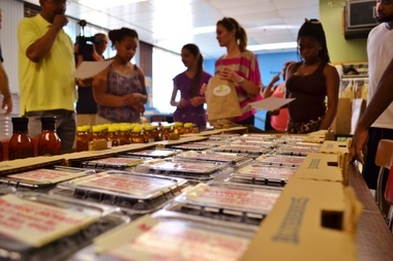CFFP1

Innovation in Real Time
The Cascadia Foodshed Financing Project (CFFP) was born from meetings between foundations and impact investors seeking a common goal: to invest in regional food enterprises. CFFP surfaced from the idea that the best method to figuring out how was to get going and see what emerges.
CFFP generated an application round through it's partner, Slow Money Northwest. The three main goals of this first round, CFFP1, were to 1) see what type of enterprises were seeking financing, 2) determine how we could collaboratively invest, and 3) finance aligned enterprises.
Application Analysis
Our application round revealed 50 businesses with over $12 million in need. The applicants were mostly startup ups with a few growth stage businesses.
Number of deals: 50
Total capital requested: $12,000,000
Number of startup businesses (less than 5 years): 46
Number of existing enterprises seeking growth or expansion: 4
Number of pure grant requests: 4
Applicants by county:
CFFP1 generated many learnings through the implemented rapid development process. While the main goal of collaboratively financing did not fully occur this first round, there were a few investments placed involving different partners. Of note: Terra Organics, a Pierce County, WA based retailer and wholesaler for organic produce that services homes, hospitals and schools, received a loan that involved Greater Tacoma Community Foundation and their CDFI partner, the National Development Council. FarmRaiser, a school-focused fundraising platform that sells local food, attracted the attention of two individual investors who collaboratively invested through their donor-advised funds at The Seattle Foundation. Micro Mercantes received support from JPMorgan Chase Foundation and Meyer Memorial Trust to grow their food enterprise training services to primarily Latino food entrepreneurs in the Portland, OR region.
Small Wins
CFFP1 generated a collection of small wins that helped create a solid foundation for future work. A key win is that the partners all share a baseline now of what we do not want to do - for instance, everyone read individual business plans and applications - and a good frame of what we do want. Below is a series of items that the CFFP partners agree are needed, items that are influencing our next work.
CFFP1 set the stage for the current work, which is broken down in to three major categories:
The Cascadia Foodshed Financing Project (CFFP) was born from meetings between foundations and impact investors seeking a common goal: to invest in regional food enterprises. CFFP surfaced from the idea that the best method to figuring out how was to get going and see what emerges.
CFFP generated an application round through it's partner, Slow Money Northwest. The three main goals of this first round, CFFP1, were to 1) see what type of enterprises were seeking financing, 2) determine how we could collaboratively invest, and 3) finance aligned enterprises.
Application Analysis
Our application round revealed 50 businesses with over $12 million in need. The applicants were mostly startup ups with a few growth stage businesses.
Number of deals: 50
Total capital requested: $12,000,000
Number of startup businesses (less than 5 years): 46
Number of existing enterprises seeking growth or expansion: 4
Number of pure grant requests: 4
Applicants by county:
- King: 16
- Multnomah: 11
- Pierce: 3
- Snohomish: 3
- Whatcom/Skagit: 2
- Other: 17
CFFP1 generated many learnings through the implemented rapid development process. While the main goal of collaboratively financing did not fully occur this first round, there were a few investments placed involving different partners. Of note: Terra Organics, a Pierce County, WA based retailer and wholesaler for organic produce that services homes, hospitals and schools, received a loan that involved Greater Tacoma Community Foundation and their CDFI partner, the National Development Council. FarmRaiser, a school-focused fundraising platform that sells local food, attracted the attention of two individual investors who collaboratively invested through their donor-advised funds at The Seattle Foundation. Micro Mercantes received support from JPMorgan Chase Foundation and Meyer Memorial Trust to grow their food enterprise training services to primarily Latino food entrepreneurs in the Portland, OR region.
Small Wins
CFFP1 generated a collection of small wins that helped create a solid foundation for future work. A key win is that the partners all share a baseline now of what we do not want to do - for instance, everyone read individual business plans and applications - and a good frame of what we do want. Below is a series of items that the CFFP partners agree are needed, items that are influencing our next work.
- A clearly articulated strategy and theory of change that defines which types of enterprises are of highest priority.
- A financial instrument benefiting the regional foodshed.
- A financial instrument that places impact goals before financial goals.
- The blended return of total investment dollars is sufficient to preserve capital.
- Grant/PRI dollars can be deployed as very low interest loans to reduce blended cost of money to enterprises.
- Provide an ongoing yield or relatively short timeline to pay back investors.
- The investors have substantial control over which enterprises their funds support.
- One request is made to a foundation board for approval and funding, rather than individual requests for each enterprise that receives funding.
- Different forms of capital can be combined in a given deal/enterprise so each investor can receive their necessary balance of impact and return on capital.
- Risk is minimized through loan guarantees where possible.
- The cost of money is low enough to support growth of the social enterprise.
- The application approval process takes an appropriate length of time to assist applicants in meeting their own goals.
- Careful screening and ongoing support for enterprises to manage risk.
- Risk is mitigated through a variety of different strategies.
- Technical assistance support is provided separate from investment funds.
- Technical assistance grants extended to assist strategically aligned enterprises.
- Build/refine current impact screens.
CFFP1 set the stage for the current work, which is broken down in to three major categories:
- Develop an overarching strategy that shows how each potential investment will help grow the regional food economy.
- Commission research that supports that strategy.
- Identify or develop a financing vehicle that use the research and supports the strategy.
- (Pending) Deploy an appropriate methodology that evaluates the investments for their financial and non-financial returns.
